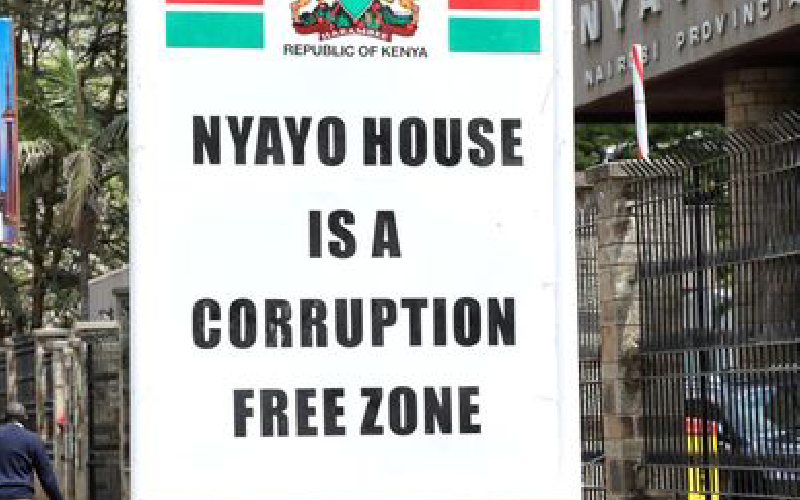
Forms of unethical practices and corruption encountered in Kenya
What Kenyans said in a survey.
Even though giving and receiving bribes thrive on mutual complicity, public officials hold a position of higher responsibility
In Summary

The recently released National Ethics and
Corruption Survey (NECS) 2024 findings by the Ethics and Anti-Corruption
Commission (EACC), revealing that graft cases in Kenya’s public offices involve
giving and taking bribes at 52.1% and 41.9% respectively, paint a grim picture
of a systemic disorder.
While disheartening, these findings are not
surprising in a country where corruption has long been a stumbling block to
fair and equitable development.
They demand urgent reflection and bold
interventions to dismantle the entrenched culture of bribery that threatens to
cripple public service, block progress, and betray the aspirations of the
ordinary Mwananchi.
The fact that over half of the reported corruption cases involve citizens offering bribes highlights a troubling reality.
Many Kenyans feel compelled to pay for services that should otherwise be their right.
Whether it’s securing marriage certificates from the Office of
the Registrar of Marriages, accessing healthcare in public hospitals, or
navigating land transfer processes at land registries across the country, the
expectation of a bribe has become an unwritten law.
On the other hand, cases of public officials
soliciting bribes expose a predatory system where power and public service have
become monetised, and integrity is as rare as a truthful Kenyan politician who
lives up to his colourful and lofty campaign promises after assuming office.
Giving and receiving bribes thrive on mutual
complicity, but the blame should not be equally shared.
Public officials who are entrusted with
serving the public, guided by the Public Officers Ethics Act and code of
conduct, hold a position of authority and responsibility.
When public officers demand or accept bribes,
they enhance a culture of impunity that erodes public trust and normalises
corruption.
Citizens, often desperate and cornered by a
dysfunctional system, may feel they have no choice but to comply.
This dynamic creates a vicious cycle where
both parties are trapped—yet it is Wanjiku, the ordinary Kenyan, not the public
official, who bears the heavier burden of paying out of pocket for the very
services funded by their taxes.
The research findings also raise a deeper
question: why does bribery persist at such alarming levels? Part of the answer
lies in systemic inefficiencies.
Cumbersome bureaucratic processes, low
accountability, and inadequate pay for public servants create fertile ground
for corruption to flourish.
When public offices are underfunded or understaffed,
delays and bottlenecks incentivize ‘speed money’ to expedite services.
Similarly, low salaries for civil servants can
foster a mindset where bribes are seen as a necessary supplement to income, an
unfortunate justification that normalizes extortion.
These structural issues, however, do not
absolve personal responsibility. The culture of bribery reflects a broader
erosion of morality and ethical standards, where self-interest often trumps
public good. To break this cycle, Kenya must adopt a multi-pronged approach.
First, streamlining public services through
digitalization can reduce opportunities for bribery. E-government platforms,
like the e-Citizen portal, have shown promise in minimizing human interaction
in processes like license renewals or permit applications, but there is cause
for worry going by recent reports by the Auditor General, Nancy Gathungu, who
exposed a loss of Sh10 billion illegally collected through the e-Citizen
portal.
Enforcement, too, must be uncompromising. Over
the past few months, EACC has been in the news regularly, arresting and
recommending prosecution of corrupt public officials caught taking bribes,
including traffic police officers, County Government, and Pension officials,
among others.
The strategy by the Commission CEO, Abdi
Mohamud, of tackling corruption at service delivery points is a big relief to
many Kenyans who agonize while seeking services in public offices.
If EACC continues to tackle both petty and
grand corruption in equal measure, then the message that choices have
consequences will be loud and clear to corrupt public officials.
Thirdly, public awareness campaigns can help
shift societal attitudes.
Many Kenyans view bribery as a necessary evil,
but campaigns highlighting its long-term costs, stunted development, unequal
access to services, and eroded trust could foster a collective rejection of the
practice.
Schools, churches, mosques, and community
forums should emphasise integrity as a core value, building a generation that
sees bribery as unacceptable rather than inevitable.
And finally, addressing the root causes
requires tackling economic inequality. Fair wages for public servants, coupled
with merit-based hiring and promotions, can reduce the temptation to solicit
bribes.
Simultaneously, empowering citizens through
better access to education and economic opportunities can lessen the
desperation that drives bribe-giving.
NECS findings are not just a wake-up call;
they present a timely opportunity to end bribery in public service.
By confronting the bribery epidemic head-on,
Kenya can rebuild trust in its institutions and pave the way for a more just
and prosperous society.
The path forward demands courage,
accountability, and a shared commitment to change.
If we fail to act, the cost of corruption will
continue to be borne by the most vulnerable, while the dream of a thriving
Kenya remains just out of reach.
Writer is a Communications Consultant

What Kenyans said in a survey.